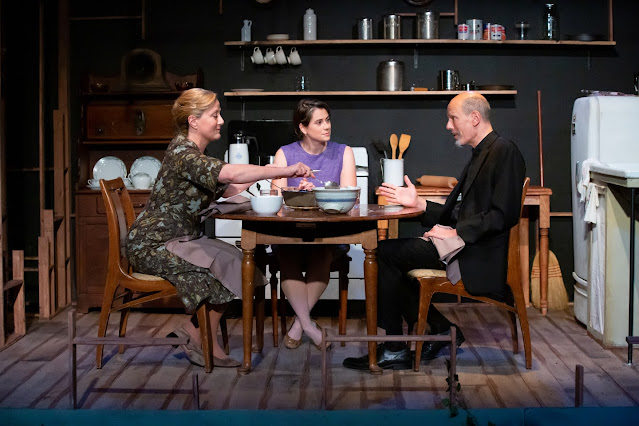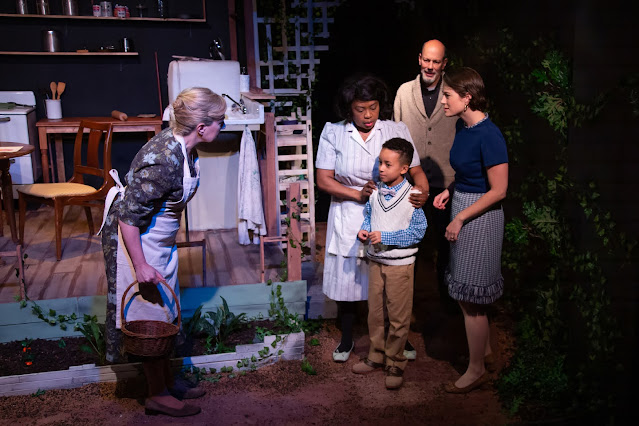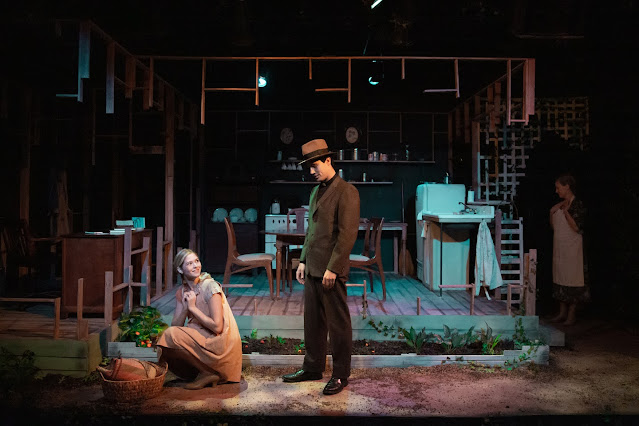Echoes in the Garden
Written by Ross G. Hewitt
Directed by Aimee Todoroff
312 West 36 Street, Floor 4, Manhattan, NYC
October 20-November 6, 2021
 |
| Cheri Wicks, Sarah Young, and Arthur Aulisi. Photo by Basil Rodericks |
Having closed the same night it opened in March 2020 due to COVID-19, Ross G. Hewitt's
Echoes in the Garden is in bloom once again at the Chain Theatre. Drawing on some of Hewitt's and his mother's own experiences, the play primarily chronicles a 1962 visit, the first in several years, by Bronx resident Ruth (Sarah Young) to her Pennsylvania parents and the house where she grew up—rendered in an impressive cutaway-design set by Mike Mroch—but which also incorporates scenes of household memories stretching back to 1922. Within the tumultuous context of the early Civil Rights Movement,
Echoes in the Garden probes reverberations of love and loss spanning three generations.
Near the beginning of the play, Ruth's mother, Marion (Cheri Wicks) reacts to a news item on the radio about President Kennedy's opposition to voter literacy laws by saying that she is unable to see why this is so important. Marion has a perfectly friendly, even affectionate relationship with her long-time domestic worker Lillian (terrifically realized by Richarda Abrams), so her skepticism of these desired reforms efficiently represents both that disengagement and inaction help to maintain racial oppression just as well as active support of white supremacy and that personal experience doesn't always scale up. Marion, we discover, resents that Ruth married a Black man and moved to the city, and she blames college for setting her daughter on this iconoclastic path. Marion has rather set ideas not only on cooking and gardening but also on the place of women and on racial mixing. Even in the first memorial flashback (signaled with a shift in lighting while the character remembering remains onstage), in which young newlyweds Marion (Caroline Portner) and Henry (Jake Roberson) arrive at the house which they will occupy over the ensuing decades, we become aware that even happy 1920s bride Marion possesses a rigid streak and a hypersensitivity regarding reputation. She has also, as we see in another memory in which Henry proposes that their church create radio programming, long been cautious of change. So when Ruth arrives with her son, David (played alternately in performance by Jace Swinger and Rhylee Watson), unexpectedly in tow, the results are less than idyllic. Ruth's visit also coincides with the 50th anniversary of the church where Henry (an excellent Arthur Aulisi) used to be pastor and now serves as chaplain and with the question of the ends to which he will direct his commemorative sermon.
 |
| Cheri Wicks, Richarda Abrams, Jace Swinger, Arthur Aulisi, and Sarah Young. Photo by Basil Rodericks |
When Henry tells Ruth that she just needs to slow down and give her mother time, it brings to mind Martin Luther King Jr.'s reminder in his "Letter from a Birmingham Jail" that "it is easy for those who have never felt the stinging darts of segregation to say, 'Wait.'" Ruth expresses dismay that even in New York City, her workplace is not really integrated, and such racial dynamics are subtly juxtaposed with another Other, the German immigrants who make up the majority of Henry's Lutheran congregation. Further fault lines in the family stem from a significant trauma in Marion and Henry's married past, an incident which shaped Ruth's childhood and the repercussions of which continue to echo through their lives as a family. A young Lillian herself (Natasja Naarendorp) entered the family's lives in the immediate aftermath of this trauma, acting almost as a mother to Marion in their initial encounter, later becoming like a member of Marion's family even as Lillian also raised her own five sons. In this light, present-day Henry's constant work and Marion's gardening begin to give the impression of being, to some degree, avoidance tactics. When Marion eventually and bluntly reveals a second trauma, one of 'womanly duty,' her legitimate complaint sheds light on without merely excusing her behavior.
 |
| Caroline Portner, Jake Roberson, and Cheri Wicks. Photo by Basil Rodericks |
There is a splendid visual moment near the end of the play in which Marion's muted all-green floral-print dress nearly blends into the foliage on the wall near which she stands while Ruth stands out and stands forward in a dress with bright red flowers on a bright white background, a silent encapsulation of Ruth's orientation towards the future and her mother's orientation towards, if not entrapment in, the past. Timely and absorbing,
Echoes in the Garden pulls no emotional or characterological punches in its portrait of an American family.
-John R. Ziegler and Leah Richards






Comments
Post a Comment